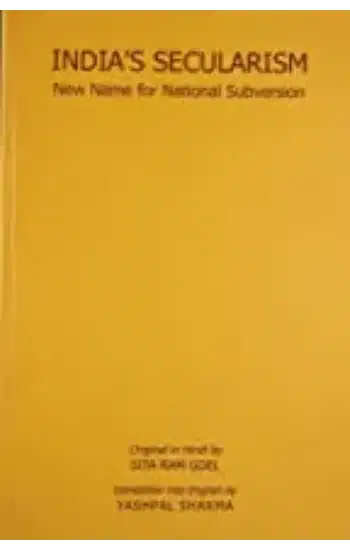
Save: 15%

Save: 25%
India’s Secularism: New Name for National Subversion
Publisher:
| Author:
| Language:
| Format:
Publisher:
Author:
Language:
Format:
₹95 ₹94
Save: 1%
In stock
Ships within:
In stock
| Weight | 170 g |
|---|---|
| Book Type |
ISBN:
Page Extent:
The ideology Secularism had taken shape during the European Enlightenment (18-19 centuries). Pandit Jawaharlal Nehru who had never used the term in his pre-independence writings or speeches, simply picked up a prestigious world form the Western political parlance and made it mean the opposite of what it meant in the West. The outcome of this perversion proved disastrous for the newly independent nation, as became more than obvious in due course. In pre-independent India, the ‘Muslim minority’ had exercised a veto on who was to be hailed as ‘nationalist’ and who was to be denounced as ‘Hindu communalist’. Now the same ‘minority’ reacquired the same veto on who was to be applauded as ‘secularist’ and who was to be hounded out as ‘communalist’. In short, the term ‘secularism’ in the post-independence period has been and remains no more than a euphemism for Hindu-baiting. The word ‘India’s’ instead of ‘Indian’ has been used in the title of this book because there is nothing Indian about Nahruvian Secularism. In fact, the term ‘secularism’ in its original Western sense had remained unknown to Indian political parlance because Indians had never envisaged or experienced a theocratic dispensation before the advent of Islam and its state apparatus in this country. Even today, traditional Indian scholars do not understand what theocracy means, and how Secularism in the Western sense stands opposed to it. And this ‘secularism’ has not been defined as Nahruvian because it is shared in common by all political parties including the Bharatiya Janata Party.
The ideology Secularism had taken shape during the European Enlightenment (18-19 centuries). Pandit Jawaharlal Nehru who had never used the term in his pre-independence writings or speeches, simply picked up a prestigious world form the Western political parlance and made it mean the opposite of what it meant in the West. The outcome of this perversion proved disastrous for the newly independent nation, as became more than obvious in due course. In pre-independent India, the ‘Muslim minority’ had exercised a veto on who was to be hailed as ‘nationalist’ and who was to be denounced as ‘Hindu communalist’. Now the same ‘minority’ reacquired the same veto on who was to be applauded as ‘secularist’ and who was to be hounded out as ‘communalist’. In short, the term ‘secularism’ in the post-independence period has been and remains no more than a euphemism for Hindu-baiting. The word ‘India’s’ instead of ‘Indian’ has been used in the title of this book because there is nothing Indian about Nahruvian Secularism. In fact, the term ‘secularism’ in its original Western sense had remained unknown to Indian political parlance because Indians had never envisaged or experienced a theocratic dispensation before the advent of Islam and its state apparatus in this country. Even today, traditional Indian scholars do not understand what theocracy means, and how Secularism in the Western sense stands opposed to it. And this ‘secularism’ has not been defined as Nahruvian because it is shared in common by all political parties including the Bharatiya Janata Party.
About Author
Reviews
There are no reviews yet.
Related products
Catholic ashrams: sannyasins or swindlers? (enlarged edition with new appendices)
Save: 0%
RELATED PRODUCTS
Catholic ashrams: sannyasins or swindlers? (enlarged edition with new appendices)
Save: 0%



Reviews
There are no reviews yet.